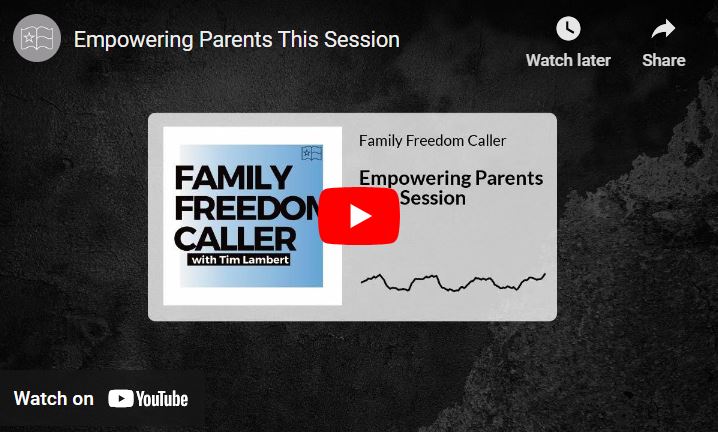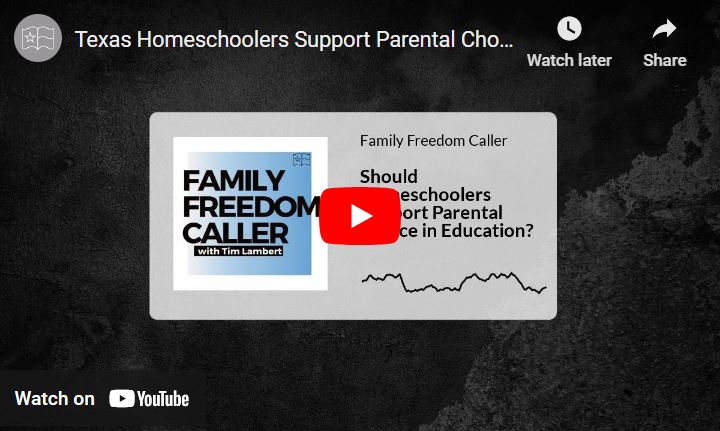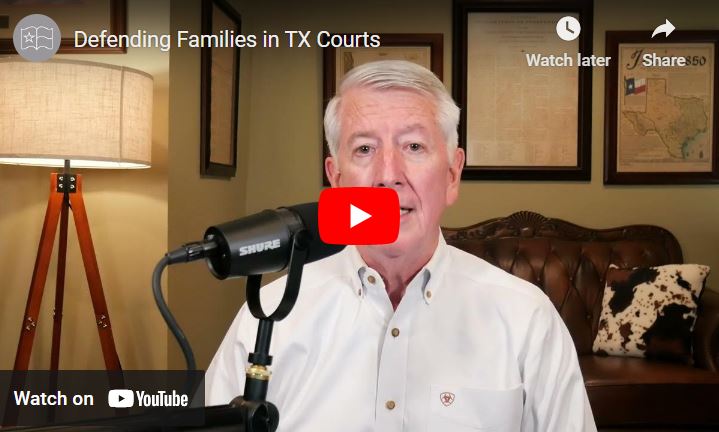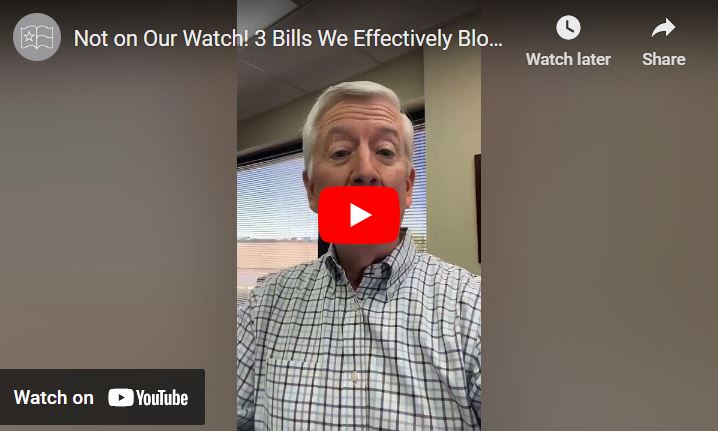What Does HB 1335 Do?
HB 1335 establishes an Education Savings Account Program for disadvantaged and special needs students, including children with disability, victims of bullying, students convicted of truancy, students who have dropped out of school or are at risk of dropping out, or are found to be victims of human trafficking/sexual assault.
Additionally, it prohibits regulation by the state or any state agency against any participant of the program or any family who chooses not to participate (see language below).
What Does SB 3 Do?
SB 3 establishes ESA eligibility for students who attended public school the previous academic year or who were born on or after Sept. 1, 2012. It also prohibits state and state agency regulation of the curriculum choice of any participant of the program or any homeschooler.
What is an ESA?
The Education Savings Account gives parents access to the funds collected through taxes and already allotted to the local public school for their child’s educational needs.
Under HB 1335, parents of eligible children can manage their child’s state and local funding equal to 90 percent attributed for that child to the local school district.
Under SB 3, parents of eligible children can manage their child’s state and local funding equal to 60 percent, 75 percent, or 90 percent, depending on income level, of the funds attributed for that child to the local school district.
How does an ESA work?
The bill mandates a parent must open an account for the child and all necessary forms to open the account will be available on the comptroller’s website.
Once an account is established, the parent can use the funds for a variety of listed educational expenses. Certain percentages of funds can be used to purchase computer hardware and software or to contribute to a qualified tuition program. Children with disabilities may also use the funds for therapies not covered by their private insurance or government benefits.
4 Key Protections
THSC requested language added to the bill to protect both participant families and those not participating from increased regulation. This language includes four key protections:
- Protections for participant families: “A private school may not be required to modify the school’s creed, practices, admissions policies, curriculum, performance standards, or assessments to receive funds distributed under the program.”
- Prohibitions against regulation by the government: Neither the state, state agencies, nor the school may, “exercise control or supervision over a program participant or an education service provider or vendor of educational products that receives funds distributed under the program.”
- For both participants and nonparticipants: An absolute prohibition against any new regulation to control the educational program of a family or private school. “A private school voluntarily selected by a parent for the parent’s child to attend or a parent who homeschools the parent’s child, with or without governmental assistance, may not be required to comply with any state law or rule governing the applicable educational program that was not in effect on January 1, 2017.”
- Protecting the curriculum choices of participating families from religious or content based discrimination. “The content or religious nature of a product or service may not be considered in determining whether a payment for the product or service is an expense allowed under Subsection (a).”
How does this bill affect freedom?
THSC ensured this bill in no way harms the current freedom for parents to raise and educate their own children and we specifically pushed for language that protected those rights. Furthermore, this bill provides freedom to those parents who are currently restricted from choosing what is in the best interest of their child.
THSC In-Depth Analysis of HB 1335—Link to HB 1335
THSC In-Depth Analysis of SB 3—Link to SB 3
Since 1986, Keeping Texas Families Free has been THSC’s priority. We will continue to stand with members to protect the freedom of homeschool families. Is your homeschool family protected? Join today!
Want updates on this and other legislation affecting Texas families? Sign up today to stay informed.
What Does HB 1335 Do?
HB 1335 establishes an Education Savings Account Program for disadvantaged and special needs students, including children with disability, victims of bullying, students convicted of truancy, students who have dropped out of school or are at risk of dropping out, or are found to be victims of human trafficking/sexual assault.
Additionally, it prohibits regulation by the state or any state agency against any participant of the program or any family who chooses not to participate (see language below).
What Does SB 3 Do?
SB 3 establishes ESA eligibility for students who attended public school the previous academic year or who were born on or after Sept. 1, 2012. It also prohibits state and state agency regulation of the curriculum choice of any participant of the program or any homeschooler.
What is an ESA?
The Education Savings Account gives parents access to the funds collected through taxes and already allotted to the local public school for their child’s educational needs.
Under HB 1335, parents of eligible children can manage their child’s state and local funding equal to 90 percent attributed for that child to the local school district.
Under SB 3, parents of eligible children can manage their child’s state and local funding equal to 60 percent, 75 percent, or 90 percent, depending on income level, of the funds attributed for that child to the local school district.
How does an ESA work?
The bill mandates a parent must open an account for the child and all necessary forms to open the account will be available on the comptroller’s website.
Once an account is established, the parent can use the funds for a variety of listed educational expenses. Certain percentages of funds can be used to purchase computer hardware and software or to contribute to a qualified tuition program. Children with disabilities may also use the funds for therapies not covered by their private insurance or government benefits.
4 Key Protections
THSC requested language added to the bill to protect both participant families and those not participating from increased regulation. This language includes four key protections:
- Protections for participant families: “A private school may not be required to modify the school’s creed, practices, admissions policies, curriculum, performance standards, or assessments to receive funds distributed under the program.”
- Prohibitions against regulation by the government: Neither the state, state agencies, nor the school may, “exercise control or supervision over a program participant or an education service provider or vendor of educational products that receives funds distributed under the program.”
- For both participants and nonparticipants: An absolute prohibition against any new regulation to control the educational program of a family or private school. “A private school voluntarily selected by a parent for the parent’s child to attend or a parent who homeschools the parent’s child, with or without governmental assistance, may not be required to comply with any state law or rule governing the applicable educational program that was not in effect on January 1, 2017.”
- Protecting the curriculum choices of participating families from religious or content based discrimination. “The content or religious nature of a product or service may not be considered in determining whether a payment for the product or service is an expense allowed under Subsection (a).”
How does this bill affect freedom?
THSC ensured this bill in no way harms the current freedom for parents to raise and educate their own children and we specifically pushed for language that protected those rights. Furthermore, this bill provides freedom to those parents who are currently restricted from choosing what is in the best interest of their child.
THSC In-Depth Analysis of HB 1335—Link to HB 1335
THSC In-Depth Analysis of SB 3—Link to SB 3
Since 1986, Keeping Texas Families Free has been THSC’s priority. We will continue to stand with members to protect the freedom of homeschool families. Is your homeschool family protected? Join today!
Want updates on this and other legislation affecting Texas families? Sign up today to stay informed.










